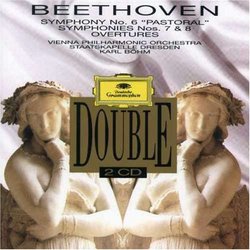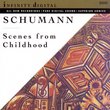| All Artists: Ludwig van Beethoven, Karl Böhm, Vienna Philharmonic Orchestra, Dresden Staatskapelle Title: Beethoven: Symphony Nos. 6, 7 & 8/2 Overtures Members Wishing: 0 Total Copies: 0 Label: Deutsche Grammophon Release Date: 7/18/1995 Genre: Classical Styles: Forms & Genres, Theatrical, Incidental & Program Music, Historical Periods, Classical (c.1770-1830), Symphonies Number of Discs: 2 SwapaCD Credits: 2 UPC: 028943792820 |
Search - Ludwig van Beethoven, Karl Böhm, Vienna Philharmonic Orchestra :: Beethoven: Symphony Nos. 6, 7 & 8/2 Overtures
 | Ludwig van Beethoven, Karl Böhm, Vienna Philharmonic Orchestra Beethoven: Symphony Nos. 6, 7 & 8/2 Overtures Genre: Classical
Karl Böhm's Beethoven is, on balance, the best complete cycle available from Deutsche Grammophon. This will come as a surprise to many, given the fact that the label relentlessly promotes performances by Herbert von... more » |
Larger Image |
CD DetailsSynopsis
Amazon.com Karl Böhm's Beethoven is, on balance, the best complete cycle available from Deutsche Grammophon. This will come as a surprise to many, given the fact that the label relentlessly promotes performances by Herbert von Karajan (three complete cycles!) and Leonard Bernstein, but for quality of playing, as well as superb sound, these versions are just about unbeatable. And at a "twofer" price, the complete set on three pairs of discs is a terrific value. --David Hurwitz Similarly Requested CDs
|
CD ReviewsBest Thing I Ever Bought. 01/08/2001 (5 out of 5 stars) "I am so utterly charmed by these recordings that it amazes me. Right away I greatly preferred Bohm's 6th to the few others that I had heard. I wasn't surprised since it appears to be universally admired. With the seventh I was immediately struck by its classical poise vs. say Kleiber's energy and drive, and thought that I needed to quickly acquire several other versions to figure out what "most" conductors thought the approach should be. I thought Solti's digital 7th was good and definitely in the Kleiber camp. Ashkenazy was next: not a carbon-copy but still also in the energy and drive catagory. Then I discovered that if you listen to the Bohm first during the listening session it doesn't seem "too polite" anymore, it sounds utterly convincing, and the others sound impossibly driven in the III and IV, and nowhere near as impressive as a total performance. And that's without even considering aspects of recording quality or tonal balance. Maybe some will think I'm missing it, but I almost can't listen to the others anymore becauce it really sounds like Bohm nailed it. Number 8. I thought I really loved this work after hearing the '62 Karajan and the Edlinger recording from Naxos. Muti and Szell followed. Good and good. Then I heard the Bohm and it was the same thing all over again. "It's so different," I thought, "slow and almost pokey, though the recording sounds great and the balance is very warm and sweet." Then a few nights later I slip on the headphones and it hits me: this is the greatest interpretation of the most absolutely wonderful music I've ever heard. Pure pleasure, perfect, fun fun fun. Now I really can't listen to other versions anymore(and the digital Solti becomes a cruel joke). So I bought the Bohm 3&9 set and can't wait to get the 1,2,4,5 set. I think Beethoven was an entertainer, not just out to impress. Get these disks, they've got beauty and balance and power in the right places." Soon to be a lost treasure J. Buxton | 01/15/2000 (5 out of 5 stars) "While some criticism of Bohm's Beethoven Symphonies relate to his tempi being too slow, I nevertheless discovered that one of my biggest considerations in choosing a Beethoven conductor, (I do own others like Reiner, Hogwood, Toscanini), turned out to be over the timpani, not the tempo. I don't know about your ears, but I can't stand listening to Beethoven Symphonies by the supposed great conductors with out-of-tune musicians and timpani that sound like dead pots! Funny thing about this underrated conductor, Karl Bohm, his musicans are always in-tune and the timpani always resonate as an integral and balanced part of the orchestra and the score. Also important to me in choosing a conductor, Bohm consistently manages to bring a presence and sense of drama to these works that the so-called great conductors often fail to achieve. I'm not an expert, but maybe, that's the best part of his operatic skill coming through. P.S. Deutsche Gramophon no longer lists these Bohm recordings of the Beethoven cycle, as available." Definitive 6th Symphony/Superb 7th Symphony John Kwok | New York, NY USA | 01/05/2001 (5 out of 5 stars) "These expansive, crisp performances of Beethoven symphonies 6, 7 and 8 are among the best available; this two CD set is clearly a key part of one of the finest recorded Beethoven symphony cycles. Karl Bohm does a superlative job conducting the Vienna Philharmonic, getting warm, vibrant performances, most notably from the string and woodwind sections. Bohm's version of the 6th Symphony soars triumphantly, ably recorded by Deutsche Grammophone's sound engineers. His version of the 7th Symphony is almost as thrilling to hear as Carlos Kleiber's version, recorded a few years later with the same orchestra, which many regard as the definitive version. The 8th Symphony is another fine performance too. It is truly amazing how clear and crisp these analogue recordings sound on CD, even though they haven't been remastered via the latest 20/24 bit sound technology."
|

 Track Listings (7) - Disc #1
Track Listings (7) - Disc #1








